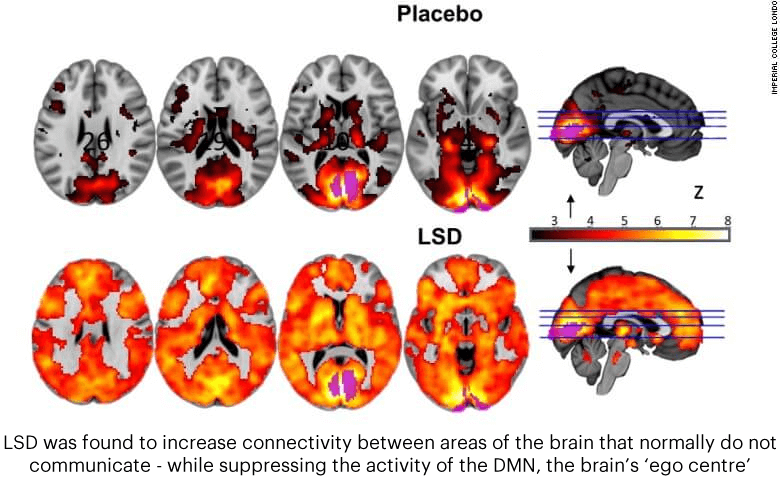26th February, 2018
The Beckley/Imperial Psychedelic Research Programme
Amanda Feilding co-founded the Beckley/Imperial Research Programme with Prof David Nutt in 2008. A decade later, the Beckley/Imperial Psychedelic Research Programme continues to develop more pioneering studies, including the first ever scientific investigation into the effects of microdosing LSD.
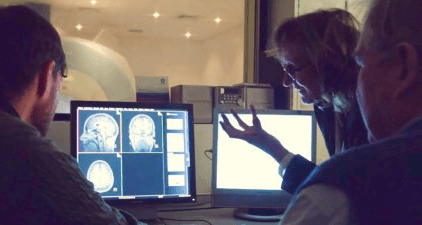
Amanda was introduced to LSD in 1965, before the compound became prohibited, and quickly realised its immense potential to help heal psychological disorders such as depression and addiction, and to bring about self-transformation through the mystical or ‘peak’ experience, and furthermore, to enhance cognitive functioning. Over the following 50 years Amanda dedicated herself to unravelling the physiological mechanisms underlying consciousness and its changing states, so that LSD and other psychedelics – such as psilocybin and DMT – could be better understood, and thereby used, as invaluable tools to overcome psychological and physical disorders, increase well-being, enhance mood, cognitive functioning, and self-realisation.
In order to undertake this new and taboo research, Amanda set up collaborations with leading scientists around the world. In 2005, she set up a scientific collaboration with Prof David Nutt – then at the University of Bristol – in order to carry out research into cannabis and the psychedelics. She later suggested that Robin Carhart-Harris carry out his PhD under Nutt’s supervision. In 2008, when David Nutt moved to Imperial College London, their collaboration became the Beckley/Imperial Research Programme, with Amanda and David as co-directors, and Robin as principal investigator. Together, they have created some of this century’s most ground-breaking psychedelic research, including the world’s first brain-imaging study of LSD, and the highly successful pilot clinical trial into the neural mechanisms underlying the profoundly therapeutic effects of psilocybin in treatment-resistant depression. The Beckley/Imperial Psychedelic Research Programme has continued developing a comprehensive account of how compounds such as LSD, psilocybin, DMT, MDMA and cannabis affect the brain to alter consciousness, and how they produce their unique therapeutic effects.
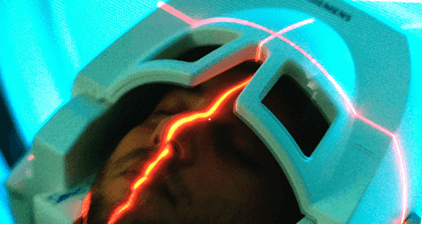
We use the latest developments in the field of neuroscience and brain imaging technology to measure brain blood distribution, brain network connectivity, and neural oscillations (rhythmical activity, or ‘brain waves’) underlying the psychedelic experience, and how these changes correlate with subjective experiences and influence clinical outcomes in emotional and cognitive measures. This new understanding greatly adds to the evidence-base supporting the therapeutic potential of these compounds, while also teaching us about consciousness itself.
Our studies have resulted in over 35 publications, many in high-impact scientific journals. Here is a small selection:
- Neural correlates of the psychedelic state as determined by fMRI studies with psilocybin (PNAS, 2012)
- Neural correlates of the LSD experience revealed by multimodal neuroimaging (PNAS, 2016)
- Increased Global Functional Connectivity Correlates with LSD-Induced Ego Dissolution (Current Biology, 2016)
- LSD‐induced entropic brain activity predicts subsequent personality change (Human Brain Mapping, 2016)
- Psilocybin for treatment-resistant depression: fMRI-measured brain mechanisms (Nature, 2017)
- Psilocybin with psychological support for treatment-resistant depression: six-month follow-up (Psychopharmacology, 2017)
The Beckley/Imperial Psychedelic Research Programme is continuing to develop more pioneering studies, including the first ever scientific investigation into the effects of microdosing LSD. This important study, led by Amanda Feilding, will start the investigation into the scientific basis of some of the self-reported benefits of this growing practice: wellbeing, mood, cognitive functioning, productivity and creativity.
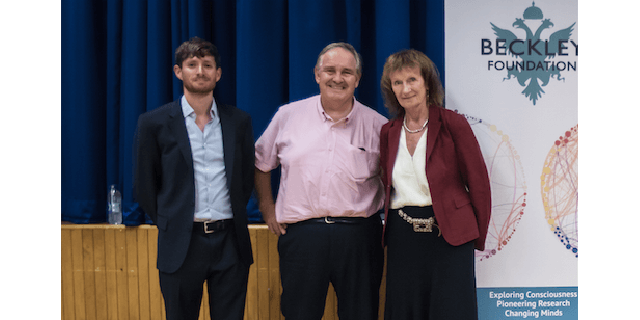
Amanda Feilding, David Nutt and Robin Carhart-Harris at LSD Revealed at the Royal Society
Notable Studies
The First Brain Imaging Study to Investigate the Effects of LSD
In 2016, we completed the first-ever neuroimaging study with LSD, with results published in PNAS and launched at the Royal Society, London, to global acclaim. LSD was shown to decrease connectivity between key regions of the brain’s Default Mode Network (DMN) that are involved in processing various aspects of selfhood – such as autobiographical memories and self-awareness, thinking about the past, and planning the future. At the same time, a great increase in global functional connectivity was observed, allowing regions that are not normally functionally connected to communicate with each other. This effect correlated strongly with the subjective experience of ‘ego dissolution’ – meaning lowering of boundaries between the self and the external world, feelings of unity with the outside world, yourself and others.
Such changes in brain function are likely to contribute to the emergence of a more complex, less predictable and more flexible state of consciousness, which may induce more free-flowing patterns of cognition, allowing users to break free from rigid modes of thought and behaviour – such as those underlying psychological disorders like depression and addiction. These results have significant implications for the neurobiology of consciousness, as well as for potential applications of LSD as a valuable tool for psychotherapy.
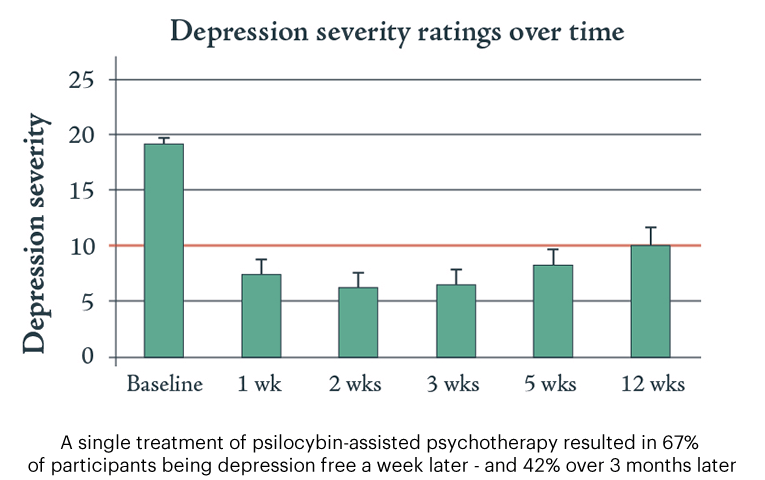 Psilocybin in the Treatment of Depression
Psilocybin in the Treatment of Depression
Our feasibility study was the first to test whether psilocybin could help people with treatment-resistant depression – those who had failed to respond to multiple previous therapies. This pilot study was published in 2016 in The Lancet Psychiatry, with remarkably positive results: 67% of subjects with treatment-resistant depression were in remission one week after taking psilocybin, and 42% remained depression-free three months later. This is an unprecedented achievement, as participants had suffered from depression for an average of 18 years and had failed to respond to any other treatment. As a direct result, the UK Medical Research Council awarded a substantial grant to the Beckley/Imperial Research Programme for a ground-breaking Phase I pilot study examining psilocybin as an aid to psychotherapy.
Ongoing Research
 Self-blinded LSD Microdosing Survey
Self-blinded LSD Microdosing Survey
Launched in September 2018, this study recruited volunteers who were currently microdosing, or were planning to start microdosing on their own initiative – but in a development from other microdosing surveys, the participants set up their own placebo control. We have closed phase 1 of the study and are not currently accepting further participants. The data collected so far will be published in a scientific journal later this year. Subject to funding, we will launch v2.0 later in 2021. Find out more here.
Investigating the Long-Term Effects of Psilocybin
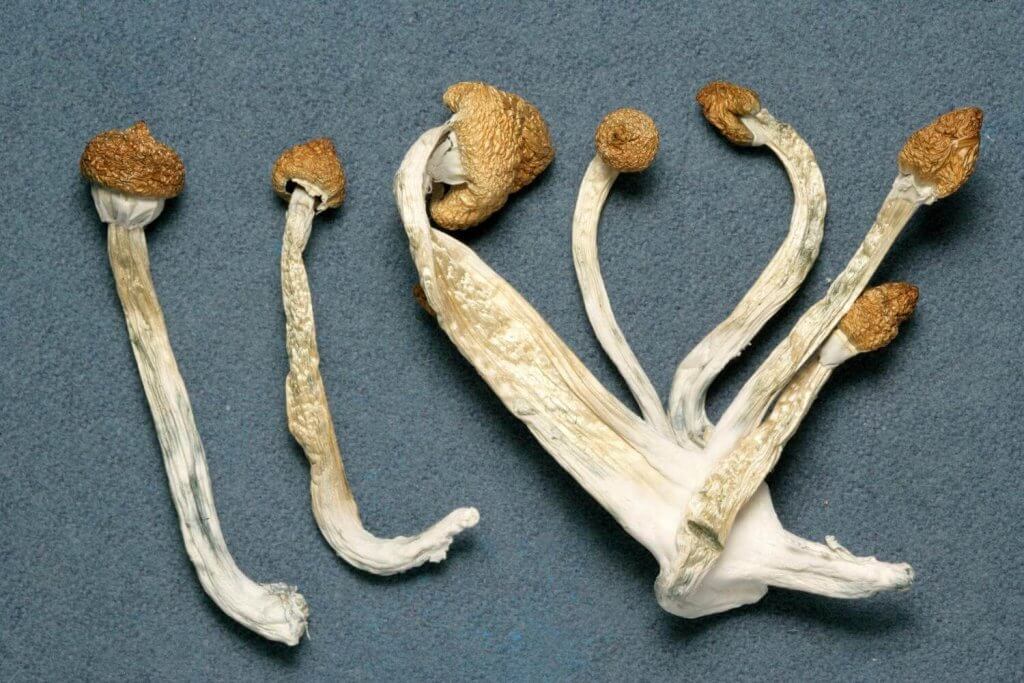
A growing body of evidence suggests that a single exposure to psilocybin can have safe, long-lasting psychological effects on healthy individuals and patient populations, improving psychological wellbeing for example. Science is currently gaining an initial understanding of the acute brain action of psilocybin and related psychedelic compounds, but their potential longer-term effects are not as well studied nor understood. This study, led by Taylor Lyons, is investigating the acute and longer-term effects of psilocybinon brain function, anatomy and psychology using a range of cutting-edge neuroimaging techniques.
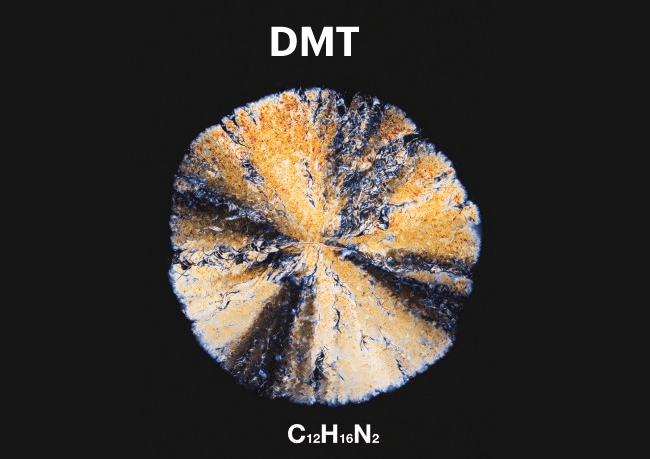
The First Study to Investigate the Effects of DMT on Brain Function
This study, led by Chris Timmerman, will use EEG and fMRI imaging to investigate brain alterations caused by DMT, the main psychoactive component in ayahuasca – an ethnobotanical medicine which we have previously demonstrated to increase neurogenesis. The study will build on our previous brain imaging studies, and will allow us to compare the effects and underlying mechanisms of DMT with psilocybin and LSD.
Effects of LSD on Neuronal and Vascular Functioning Using Optogenetics
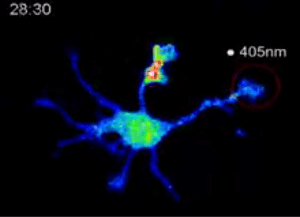
In this pioneering project, Amanda is collaborating with Tobias Buchborn, who leads the study with Prof Thomas Knopfel. This study employs the ground-breaking technique of optogenetic electrophysiology to make neurons within the living brain emit light whenever they are activated. In this way, we can zoom into the key cells of the brain that are targeted by LSD – in particular, cortical pyramidal cells – and illuminate their distinctive responses to the compound. By looking at the effects of LSD on a microscopic scale, we hope to discover the specific effects of LSD on blood vessels and neuronal functioning, and integrate these results with changes observed at the behavioural level.
The Beckley/Imperial Psychedelic Research Team
 Amanda Feilding initiated her collaboration with David Nutt in 2005, when he was at the University of Bristol. When he moved to Imperial College London in 2009, they founded and became co-directors of what is now called the Beckley/Imperial Psychedelic Research Programme. Amanda is founder and director of the Beckley Foundation, and Prof. Nutt is currently the Edmond J. Safra Professor of Neuropsychopharmacology and director of the Neuropsychopharmacology Unit in the Division of Brain Sciences at Imperial College London.
Amanda Feilding initiated her collaboration with David Nutt in 2005, when he was at the University of Bristol. When he moved to Imperial College London in 2009, they founded and became co-directors of what is now called the Beckley/Imperial Psychedelic Research Programme. Amanda is founder and director of the Beckley Foundation, and Prof. Nutt is currently the Edmond J. Safra Professor of Neuropsychopharmacology and director of the Neuropsychopharmacology Unit in the Division of Brain Sciences at Imperial College London.
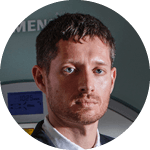
Robin Carhart-Harris joined the Beckley/Imperial Psychedelic Research Programme in 2009 as Lead Investigator. He has a degree in Psychology, MA in Psychoanalysis, and PhD in the field of Psychopharmacology, and is currently the Director and Head of Centre at the Imperial College Centre for Psychedelic Research.

Mendel Kaelen is a Beckley/Imperial Research Programme Fellow, having been a PhD student in the Neuropsychopharmacology Unit in the Division of Brain Sciences at Imperial College London. In our LSD study, Mendel lead the investigation into the interaction between LSD and music and the implications this has for psychedelic-assisted psychotherapy.

Leor Roseman is a postdoctoral researcher at the Centre for Psychedelic Research, having completed his PhD and Masters at Imperial College London. His research focuses on the psychological correlates of the psychedelic experience, and has explored the extent to which the visual cortex is involved in the psychedelic state.

Chris Timmerman has a background in cognitive neuroscience and psychology. He is completing his PhD on the effects of psychedelics in consciousness and brain connectivity. He is currently leading a study investigating the effects of DMT in the human brain with EEG and fMRI and relating these measures with the subjective experience.

Eline Haijen did her bachelors degree in Psychology from Maastricht University from 2012 to 2015. She then completed a research masters in Cognitive and Clinical Beuroscience in 2017, during which she joined the Beckley/Imperial research team for a 9-month internship. She has coordinated the Beckley/Imperial microdosing study.

Taylor Lyons began her PhD at Imperial College in 2015. She is working within the Centre for Neuropsychopharmacology and the Laboratory for Neuronal Circuit Dynamics to investigate the effects of psychedelic compounds on the brain by using optogenetic and neuroimaging techniques. As part of the Beckley/Imperial Research Programme, she examines the acute and potential longer-term effects of psilocybin on brain function, anatomy and psychology.

Tobias Buchborn is a postdoctoral fellow working with the Beckley/Imperial Psychedelic Research Programme in the laboratory of Prof Thomas Knöpfel. Using optogenetics he explores the molecular biology of psychedelics and its translation into behavioural changes. He will lead the upcoming project using optogenetic electrophysiology to study the effects of LSD on neural function and brain vasculature.
Beckley/Imperial Psychedelic Research in the Media
The Beckley Foundation Intends To Study Links Between Microdosing LSD And Creativity
Inside the Mind of Amanda Feilding, Countess of Psychedelic Science
15th February, 2018
Drug Decriminalisation Campaigner Amanda Feilding On The Mental Health Benefits of Psychedelics
August 27th, 2017
The brain on DMT: mapping the psychedelic drug's effects
July 3rd, 2017
First-Ever LSD Microdosing Study will Pit the Human Brain Against AI
May 9th, 2017
Magic mushrooms lift severe depression in trial
May 17, 2016
LSD's impact on the brain revealed in groundbreaking images
April 11, 2016
Key Beckley/Imperial Publications
Other Beckley/Imperial Publications
- Quality of Acute Psychedelic Experience Predicts Therapeutic Efficacy of Psilocybin for Treatment-Resistant Depression (2018)
- Increased amygdala responses to emotional faces after psilocybin for treatment-resistant depression (2017)
- Psilocybin with psychological support improves emotional face recognition in treatment-resistant depression (2017)
- Increased nature relatedness and decreased authoritarian political views after psilocybin for treatment-resistant depression (2018)
- Natural speech algorithm applied to baseline interview data can predict which patients will respond to psilocybin for treatment-resistant depression (2018)
- The hidden therapist: Evidence for a central role of music in psychedelic therapy (2018)
- LSD modulates effective connectivity and neural adaptation mechanisms in an auditory oddball paradigm (2017)
- LSD enhances music-induced imagery via changes in parahippocampal connectivity (2016)
- LSD enhances the emotional response to music (2015)
- Neural correlates of the psychedelic state as determined by fMRI studies with psilocybin (2012)
- Finding the self by losing the self: neural correlates of ego dissolution under psilocybin (2015)
- Implications for psychedelic-assisted psychotherapy: functional magnetic resonance imaging study with psilocybin (2012)
- Connectome-harmonic decomposition of human brain activity reveals dynamical repertoire re-organization under LSD (2017)
- LSD alters eyes-closed functional connectivity within the early visual cortex in a retinotopic fashion (2016)
- Decreased mental time travel to the past correlates with default-mode network disintegration under LSD (2016)
- Altered Insula Connectivity Under MDMA (2017)
- The effect of acutely administered MDMA on subjective and BOLD-fMRI responses to favourite and worst autobiographical memories (2014)
- The effects of psilocybin and MDMA on between-network resting state functional connectivity in healthy volunteers (2014)
- The Effects of Acutely Administered 3,4-Methylenedioxymethamphetamine on Spontaneous Brain Function in Healthy Volunteers Measured with Arterial Spin Labeling and Blood Oxygen Level-Dependent Resting State Functional Connectivity (2014)
- The entropic brain: a theory of conscious states informed by neuroimaging research with psychedelic drugs (2014)
- Functional connectivity measures after psilocybin inform a novel hypothesis of early psychosis (2013)
- A placebo-controlled investigation of synaesthesia-like experiences under LSD (2016)
- The paradoxical psychological effects of LSD (2016) Semantic activation in LSD: evidence from picture naming (2016)
- A qualitative report on the subjective experience of intravenous psilocybin administered in an FMRI environment (2014)
- LSD enhances suggestibility in healthy volunteers (2015)
- The administration of psilocybin to healthy hallucinogen-experienced volunteers in a mock-fMRI environment: a preliminary investigation of tolerability (2010)
Podcast
- All
Links
- All
Support
- All
BIPRP
- All
Science Talk
- All
Amanda's Talks
- All
- Video Talk
- Featured
- 2016 Onwards
- 2011-2015
- 2010 and Earlier
- Science Talk
- Policy Talk
One-pager
- All
Music
- All
Amanda Feilding
- All
Events
- All
Highlights
- All
Psilocybin for Depression
- All
Current
- All
Category
- All
- Science
- Policy
- Culture
Substance/Method
- All
- Opiates
- Novel Psychoactive Substances
- Meditation
- Trepanation
- LSD
- Psilocybin
- Cannabis/cannabinoids
- Ayahuasca/DMT
- Coca/Cocaine
- MDMA
Collaboration
- All
- Beckley/Brazil Research Programme
- Beckley/Maastricht Research Programme
- Exeter University
- ICEERS
- Beckley/Sant Pau Research Programme
- University College London
- New York University
- Cardiff University
- Madrid Computense University
- Ethnobotanicals Research Programme
- Freiburg University
- Medical Office for Psychiatry and Psychotherapy, Solothurn
- Beckley/Sechenov Institute Research programme
- Hannover Medical School
- Beckley/Imperial Research Programme
- King's College London
- Johns Hopkins University
Clinical Application
- All
- Depression
- Addictions
- Anxiety
- Psychosis
- PTSD
- Cancer
- Cluster Headaches
Policy Focus
- All
- Policy Reports
- Advisory Work
- Seminar Series
- Advocacy/Campaigns
Type of publication
- All
- Original research
- Report
- Review
- Opinion/Correspondence
- Book
- Book chapter
- Conference abstract
- Petition/campaign
Search type

